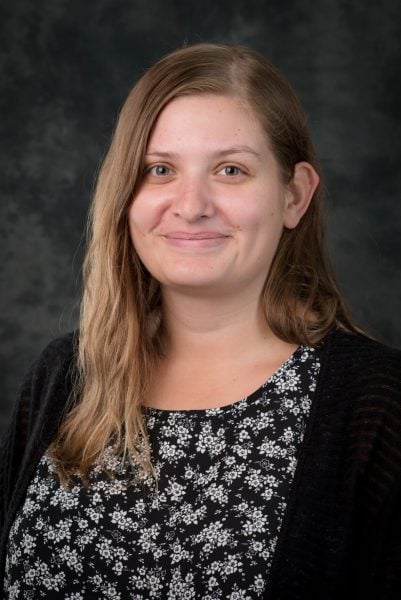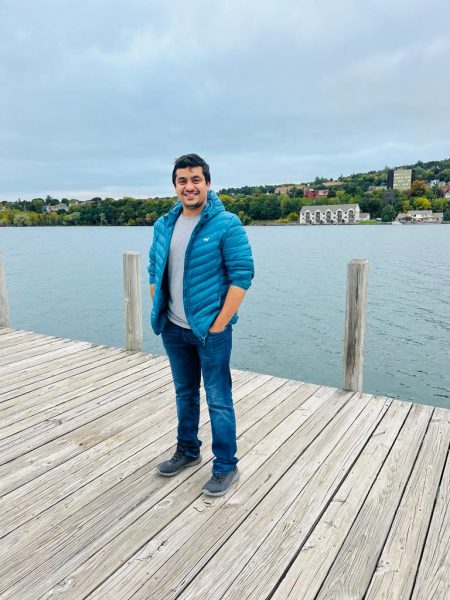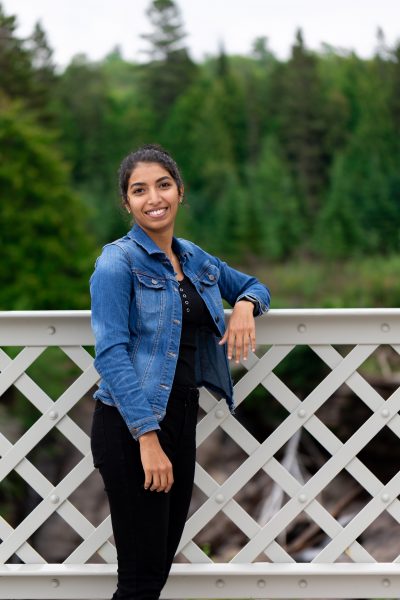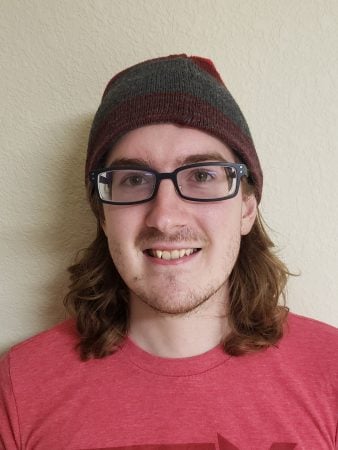Erin Eberhard came to Michigan Technological University in June 2015 after earning her B.S. in Ecology and Evolutionary Biology at the University of Michigan. She earned her Master’s degree from Michigan Tech in summer 2017 with the thesis, “Co-occurrence of nitrogen fixation and denitrification across a stream nitrogen gradient in a western watershed,” as part of Dr. Marcarelli’s lab NSF CAREER project looking at the dynamics of nitrogen fixation and denitrification in streams – read more about it in Biogeochemistry (Eberhard et al. 2018). She has continued her PhD studies on the same project, focusing on small-scale factors that facilitate the co-occurrence of N transformations and how they are related to microbial assemblages in streams and also across wetland-stream-lake interfaces of Great Lakes coastal wetlands. After graduation, she plans to pursue a career in a federal or state agency working to conserve and protect freshwater ecosystems and communicate science with the public.
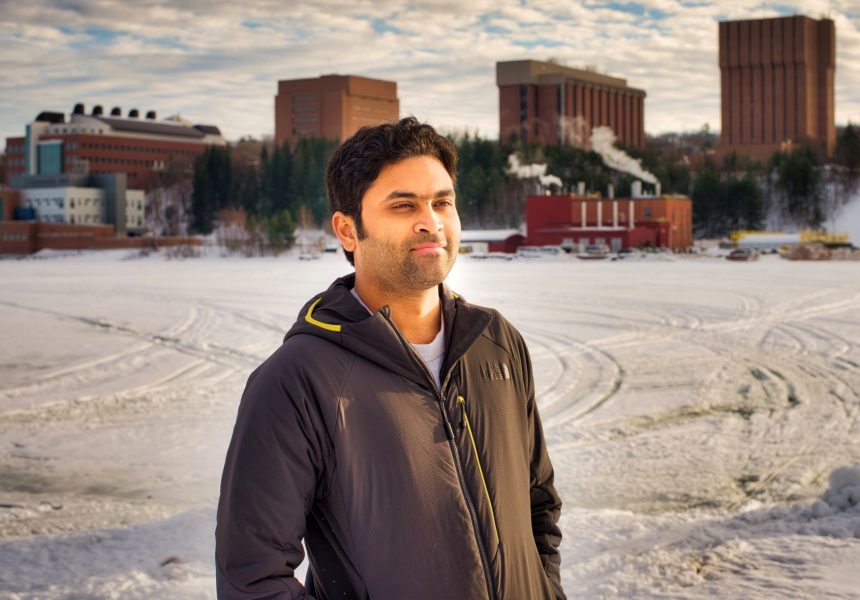
Statement
Firstly, I want to thank MTU for awarding me the prestigious doctoral finishing fellowship award. I was born and brought up in south India. I did my undergraduate and master’s degree at IIT-Dhanbad, which accepts only the top 1% of students of India every year. For my Ph.D., I was offered a full scholarship at University of Queensland, Australia, and Penn state university, but I rather chose MTU to work under Dr. S. Komar Kawatra.
Prof Komar Kawatra is leading the CO2 capture and utilization research team at Michigan Tech University. Our goal is to capture CO2 from coal-fired power plants at minimal cost and convert CO2 into value-added products like Syn-gas, Oxalic acid, etc. For the last four years, I have worked extensively on carbon capture and utilization projects. I and my team of undergraduate researchers have continuously improved the efficiency of our CO2 scrubber system and also tested the prototype in a pilot-scale environment. We presented our work at International Conferences representing MTU and received applause. I have published several papers on chemical absorption CO2 capture, in high-impact journals.
I Worked on multiple CO2 capture projects and successfully submitted reports. Successfully captured CO2 from Michigan Technological University steam plant as part of my Ph.D. thesis project. I have installed our pilot-scale CO2 scrubber system at the Michigan tech Power plant and reduced the CO2 emissions from 8% to 4%. I have trained Sam Root, a Chem Eng. Freshman on this project, who won national awards in Poster competitions.
Photography and rock climbing are two of my favorite pastimes. I am extremely pleased with my decision to pursue my Ph.D. at MTU. The upper peninsula of Michigan is a photographer’s dream, both in winter and in fall. When I have free time, I like to explore different parts of UP and take some landscape pictures.
Neel Uday Desai
Atmospheric Sciences
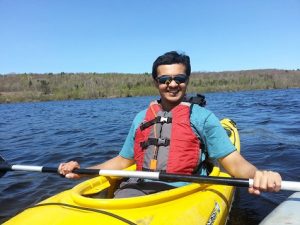 I came to Michigan Tech in Fall 2013 to start my Phd in Atmospheric Sciences after finishing my masters from University of Michigan in Aerospace Engineering and my bachelors from University of Mumbai in Mechanical Engineering.
I came to Michigan Tech in Fall 2013 to start my Phd in Atmospheric Sciences after finishing my masters from University of Michigan in Aerospace Engineering and my bachelors from University of Mumbai in Mechanical Engineering.
Since I began learning the basics of science, the effects of vibrations on environments has always fascinated me. As Nikola Tesla said, “If you want to find the secrets of the universe, think in terms of energy, frequency and vibration.” It was with this aim that I started my Ph.D journey in Fall 2020.
My research has been in regards with “Metastructures”. These are unique structures which absorb vibrations in a system in particular frequency range, often called as ”bandgap”. It is because of this bandgap phenomenon that metastructures are widely used to mitigate vibration effects. Owing to large number of applications, it becomes important to estimate bandgaps in a metastructure to predict the frequency range in which the vibrations will be absorbed so that metastructures can be designed for various applications.
Through my research, I have aimed to developed new methods to estimate these bandgaps. The current methods available in the literature require a physics-based model of the metastructure (analytical model, finite/spectral element model) in order to estimate bandgaps. However, for various anisotropic materials, the material properties are difficult to quantify accurately which makes the physics-based model inaccurate. My research aims to overcome these limitations by developing methods which estimate bandgaps using purely experimental data. We have used the experimental data to study how a vibration wave is propagating through the metastructure (dispersion curve) and estimated bandgaps. Various other techniques such as substructuring, data-driven modeling algorithms were utilized. The developed techniques considerably reduced the design efforts required and made the entire design process much easier.
The funding provided by this fellowship will truly be helpful for me in putting all my energies in finishing my thesis in time and complete my Ph.D.!
I am grateful to the Graduate School for granting me this fellowship.
My advisor, Dr. Sriram Malladi has been more than helpful in guiding me through various ups and downs throughout my Ph.D journey. I am truly thankful for the relentless support he and his family has given me. Last but certainly not the least, I am thankful to my family i.e. my wife and my parents for their support in every aspect of my journey!
I started as a PhD student in Atmospheric Sciences at Michigan Tech in August 2018. My interest in Atmospheric Sciences began during an elective course I took while pursuing my master’s degree in physics at the National Institute of Technology (NIT Calicut). Since then, my interest in Atmospheric Sciences has grown, and I have been eager to learn more about it.
My doctoral research focuses on investigating the physical, chemical, and optical properties of aerosols, which are particles suspended in the atmosphere, specifically those emitted from biomass burning. Over the course of five years, with the support of my advisor and colleagues at Michigan Tech, I have gained valuable knowledge and experience that will undoubtedly benefit me in my future endeavors. Additionally, I had the opportunity to expand my exposure and understanding of the subject through an internship at Pacific Northwest National Laboratory (PNNL), where I worked with Dr. Swarup China. During my internship, I estimated the optical properties of tar ball particles that are formed during biomass combustion. I also studied the physical and chemical properties of aerosols from an Urban polluted region that is highly influenced by biomass burning.
I am grateful to the Graduate Dean Awards Advisory panel for granting me the finishing fellowship award and to my advisor, Prof. Claudio Mazzoleni, for his unwavering support and guidance throughout my PhD journey. I also thank my mentor at PNNL, Dr. Swarup China for his hard work and dedication in helping me complete my PhD. Additionally, I express my thanks to both my current and former research group members for engaging in excellent discussions and fostering a spirit of teamwork. I eagerly anticipate defending my thesis and advancing along my chosen career path.
Qi Zhong
Physics
I came to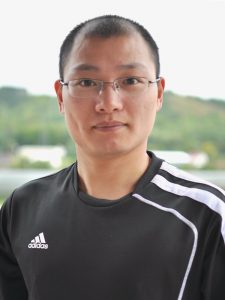 Michigan Tech in Spring 2014 and joined Dr. Ramy El-Ganainy’s group in Summer 2016. Currently, my research focuses on the fundamental aspects and applications of non-Hermitian physics. In general, non-Hermiticity arises in open systems that exchange energy with their environment. Particularly, my work deals with a special type of non-Hermitian degeneracies called exceptional points. I have explored the mathematical features of these singularities as well as their potential benefit in building new photonic components such as ultra-responsive optical sensors as well as a new generation of optical amplifiers that outperform standard devices. Additionally, I am also investigating how the engineering of dissipation in non-Hermitian nonlinear optical systems can be used to build new light sources that can produce coherent light at any color on demand.
Michigan Tech in Spring 2014 and joined Dr. Ramy El-Ganainy’s group in Summer 2016. Currently, my research focuses on the fundamental aspects and applications of non-Hermitian physics. In general, non-Hermiticity arises in open systems that exchange energy with their environment. Particularly, my work deals with a special type of non-Hermitian degeneracies called exceptional points. I have explored the mathematical features of these singularities as well as their potential benefit in building new photonic components such as ultra-responsive optical sensors as well as a new generation of optical amplifiers that outperform standard devices. Additionally, I am also investigating how the engineering of dissipation in non-Hermitian nonlinear optical systems can be used to build new light sources that can produce coherent light at any color on demand.
I would like to thank the Graduate School for granting me this fellowship, which will allow me to focus on my dissertation writing and thesis defense. I am grateful for the Physics Department for the continuous support and would like to thank my adviser Dr. El-Ganainy for guiding me throughout my work.
Nupur Bihari
Materials Science and Engineering
I moved to the beautiful city of Houghton as a Master’s student in Electrical Engineering and worked on my thesis (under Dr. Paul Bergstrom) on a microfabricated blood typing sensor. Continu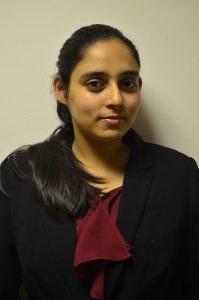 ing to explore semiconductor microfabrication and vacuum systems, I joined the Department of Materials Science and Engineering in Fall 2016 under Dr. Joshua Pearce. I began my PhD research on integrating the disparate worlds of additive manufacturing and semiconductor fabrication.
ing to explore semiconductor microfabrication and vacuum systems, I joined the Department of Materials Science and Engineering in Fall 2016 under Dr. Joshua Pearce. I began my PhD research on integrating the disparate worlds of additive manufacturing and semiconductor fabrication.
Additive manufacturing is radically changing the way polymer-based components are manufactured. It has enabled customization, reduced costs and led to unprecedented growth in the acceptance and use of polymers in scientific research equipment. Despite the ubiquity of 3-D printed materials in research applications, they have remained conspicuously absent from semiconductor research, primarily due to their apparent incompatibility with vacuum equipment. This incompatibility is mainly in terms of outgassing of volatile organic species. Outgassing in polymers arises when low molecular mass entities present in the material matrix escape when exposed to vacuum. If polymers are coated with a conformal, crystalline, inorganic film introduced with atomic layer deposition (ALD), then outgassing can be reduced to a large extent because the surface layer acts as a seal to prevent these low molecular weight species present in the bulk of the material from escaping. Going a step further, I am in the process of building a first of its kind ALD system almost entirely out of 3-D printed polymeric materials.
I would like to express my gratitude to Graduate School for the finishing fellowship. I am honored to have my research get this recognition.
The American Geosciences Institute is proud to announce that applications are open for the 3rd annual Harriet Evelyn Wallace Scholarship. The Scholarship was established from a bequest given to AGI by Harriet Evelyn Wallace, who was one of the founding members of the Geoscience Information Society (GSIS). This scholarship is for the support of female graduate students in the United States studying the geosciences. A new scholar is named each year, and every scholar is eligible for up to two years of support. The current annual award is $5,000.
This year, we will be giving the award to one qualified Master’s student studying geoscience. PhD applications will not be reviewed this year. The application deadline is January 5th, 2015. The successful applicant will be a thesis-based, full-time student and must be a U.S. citizen or permanent resident. The Harriet Evelyn Wallace Scholarship is merit-based and applicants will be evaluated on their probability of successfully completing a geoscience graduate program and transitioning into the geoscience profession following graduation.
For more information or to submit an application, please visit:
http://www.americangeosciences.org/workforce/harriet-evelyn-wallace-scholarship.
If you have any questions regarding the scholarship, or while submitting your application, please contact the scholarship coordinator Heather Houlton at wallacescholarship@americangeosciences.org.
Each summer, the International Institute for Applied Systems Analysis (IIASA), located in Schloss Laxenburg near Vienna, Austria, hosts a selected group of graduate students, primarily doctoral, from around the world in its Young Scientists Summer Program (YSSP). These students work closely with IIASA’s senior scientists on projects related both to their thesis research and one or more IIASA research programs.
Application deadline is January 13, apply online.
For students selected to participate, funding is available for travel and living support, principally from IIASA’s twenty-one National Member Organizations (NMOs), who fund primarily students from NMO countries. However, applicants from all nations are eligible to apply, and some unrestricted fellowships are available.
IIASA is an international, nongovernmental research institution located just outside Vienna, Austria, supported by its twenty-one National Member Organizations. IIASA is known for its interdisciplinary research, combining natural and social sciences with integrated assessment techniques and advanced mathematical methodologies, with a goal of providing policy insight on issues of regional and global importance in the following fields:
GLOBAL PROBLEM AREAS
- Energy and Climate Change
- Food and Water
- Poverty and Equity
PROGRAM AREAS
- Energy
- Transitions to New Technologies
- Advanced Systems Analysis
- Ecosystem Services and Management
- Mitigation of Air Pollution and Greenhouse Gases
- Evolution and Ecology
- World Population
- Risk Policy and Vulnerability
- Water
Ever since my freshman year of high school when another older student approached me to join a physics club sponsored by Fermilab which focused on cosmic ray air showers, I’ve been fond of both the theoretical and experimental side of physics. It is quite the coincidence, or perhaps the exact opposite, that my research now focuses on detecting some of the highest energy gamma-ray air showers with HAWC.
After attending a very large high school in a suburb of Chicago, I decided to apply to Tech after a family friend recommended the school and I immediately enjoyed the smaller and closer-knit feel of Tech. I did both my undergraduate (B.S. in Physics and B.S. in Computational Math) and my graduate studies at Tech and the end of my academic journey with Tech is a very bittersweet moment for me. My Ph.D. thesis is mostly focused on using gamma-rays detected by HAWC over nearly a decade to create a catalog of some of the most extreme galactic particle accelerators like supernova remnants, pulsars, and micro-quasars. Catalogs historically have provided useful information to both theorists and other experiments to help guide and accelerate research in and beyond the field of astrophysics. To help create this catalog and assist future analysis work in the HAWC collaboration I developed a software framework to automate source finding in the HAWC dataset.
I want to thank many different organizations and people who have helped me throughout my university journey. First, the Graduate Dean Awards Advisory Panel for providing their wonderful support to help me finish strong. Second, my advisor Prof. Huentemeyer along with our research group for the invaluable support they’ve provided to me during my Ph.D. studies. Third, the physics department as a whole because without their support both personally and fiscally throughout both my undergrad and grad experience I would not have made it to where I am today.
